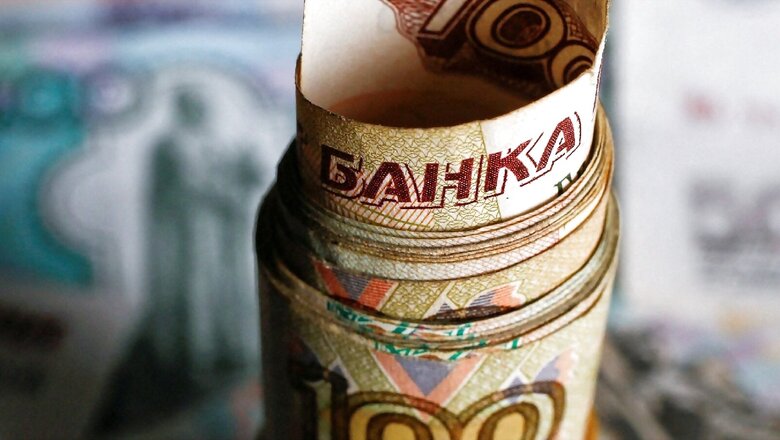
views
The collective might of the United States of America and the European Union, including so-called neutral Switzerland, was visible when they slapped a series of sanctions on Russia. However, these sanctions need to be looked at a little more closely as there is a lot to them than what meets the eye.
Tokenism and Settling Scores
Switzerland has slapped sanctions on certain Russian oligarchs. Who are these certain oligarchs? No one knows. Is it possible that Switzerland is using this Ukraine-Russia war as an opportunity to settle scores with these “oligarchs”?
Japan said it would limit its transaction with the Russian central bank and sanction certain banks in Belarus, which did not even go to war with Ukraine directly. So why authorise sanctions on Belarus? What kind of scores is Japan looking to settle?
New Zealand says it will prohibit the export of specific hardware to Russian security forces and the Russian military. However, what is funny is that the total exports of New Zealand to Russia are merely $250 million-$280 million. Of this, military hardware must be contributing merely $50 million-$100 million.
France applied sanctions on the import-export of luxury goods from Russia. Luxury goods? What have luxury goods got to do with the ongoing war? Prevent Russians from getting ready for the battle by dressing well and applying mascara? Can it get more ridiculous than this?
Smaller nations like Taiwan have joined the fray without specifying what sanctions they are slapping on Russia. These sanctions are nothing but tokenism and a way to settle scores with certain oligarchs.
Sanctions against Putin
The sanctions included sanctions against Russian President Vladimir Putin’s holdings abroad. Conspiracy theorists have been speculating that Putin has much treasure hidden somewhere; no one knows where. His official holdings are minuscule, and none of it is abroad. Sanctioning Putin’s wealth abroad has become a butt of jokes in the international community.
Sanctions by US and EU
The United States, the European Union, the United Kingdom and Canada banned “certain Russian banks” from SWIFT (Society for Worldwide Interbank Financial Telecommunication). Which are these certain banks? No clarity has been offered on that. These could be non-performing banks and not those that bring money into the coffers of the Western banking system. Specific “restrictive measures” were also imposed to prevent the Russian Central Bank from deploying its international reserves. The EU hopes that these measures would paralyse Russia’s central bank’s assets and freeze its transactions, making it impossible to liquidate its assets. The ‘Golden Passport’ system was also put on hold for a while. It means that people with money cannot enter my country. It is not easy to believe that the United States and the European Union do not love money anymore.
The United States froze accounts of specific individuals whom it believed had saved up “slush money” or rainy-day cash in US banks. They did this by freezing transactions by the state-owned Russian Direct Investment Fund. This Russian direct investment fund was receiving payments from wealthy Russian individuals who were earning in Russia and saving it in the United States. With one stroke of the presidential decree, the money was gone. Poof. Thirteen state-owned banks of Russian origin in the United States have been affected as well. Specific individuals in America think these banks are close to the Kremlin.
Investment Pattern of Oligarchs and HNIs
No High Net Worth Individuals (HNIs) put all their money in one basket. If any financial institution thought these oligarchs would invest only in the United States and the European Union, they are mistaken. What these sanctions, however, showed to these HNIs and other potential investors who would be looking to invest in the United States and European Union is that the banking system is fickle, state-owned and therefore, could be controlled by a stroke of a pen. The banking system of Switzerland too isn’t reliable anymore.
Gaping Holes in Swiss and Western Banking Systems
The Swiss banking system, which remained a neutral banking system and benefitted a lot, especially after the Second World War when people with war booty came to Switzerland and made it what it is today, has been exposed. Putting your money in a Swiss bank isn’t safe anymore is the message it sends out to the world. Anything that happens in your country and that does not go well with either the United States or the European Union or any other catastrophe that could affect Switzerland’s thought process would lead to you losing your money. The Swiss banking system has sent this message loud and clear to the world.
The uncertainty of the Western banking system has been exposed in these sanctions. The message it has sent out loud and clear is that sanctions could be selective, conditional and at the whims and fancies of the state. The message is that states, to further their narrative, will play with your money. Banks traditionally enjoyed their wealth by holding onto people’s wealth and making money out of it. A bank’s contribution, directly in value addition in terms of goods or services, is nothing. But, the fact that it could selectively get after their customers may not go well with other customers who have not been sanctioned as yet.
Effect of Sanctions on Russian Economy
Short term effect on the Russian economy as a result of these sanctions is enormous. The Rouble is already down to 50 per cent of its value against the dollar. People who held the Rouble outside of Russia have lost their money, no doubt. And as expected, when any country goes to war, its economy tanks, and inflation rises. It’s true in all cases of conflict. The Russia-Ukraine crisis is no different. The Russian economy has tanked, Ukraine’s economy is next to nothing, and the European economy has taken a beating.
How to mitigate the effects of the uncertainty of the Western, including the Swiss, banking system? The burning question that every investor or a potential investor must be asking themselves is: if I store my money in the Western banking system, including the Swiss banking system, will it be safe? How do I transact without being controlled by state policies and states’ whims and fancies? That is the fundamental question that needs to be answered, and there appears to be an answer in the form of cryptocurrency.
Cryptocurrency and Alternate Modes of Transactions
What if I tell you, one in every four US dollars in existence came in into being in 2020 after COVID hit Wall Street? It went from having its worst weeks to its best weeks in no time. The practice is known as “quantitative easing” by which during an economic crisis, the central bank puts more money into the system to keep it running. History has taught the world that printing money to solve monetary problems doesn’t end well as we have seen in Zimbabwe recently. Simple economics suggests more money into the system is a recipe for inflation and rendering the currency worthless. Zimbabwe had to print a billion Zimbabwean Dollar notes for its citizens to buy bread. The point here is simple — in the connected digital world which has rendered the world a village, we might have a chance of having blockchain technology with a set of rules that can’t be changed according to geopolitics or economics being used as a medium of exchange, which, in essence, is decentralisation.
Cryptocurrency has boomed since the pandemic came into being, investors have looked for safe havens for their money and the direct result of the printing of US dollars in 2020 was this boom. In the current scenario of war, sanctions and especially Russia’s exclusion from SWIFT, cryptocurrency will be an alternative that will be used by Russia to transfer funds, reducing the agitation caused by the West. Crypto has been the medium of exchange for organisations/countries to launder money in times where regulated, centralised options are not an option.
The mere fact that a decentralised option exists for the Russians is a prime example of the liberation cryptocurrency presents to the modern world.
Effect of Sanctions on Dollar and Euro
The long-term effect of these sanctions on Dollar and Euro is likely to be two-fold: First, their prominence as currencies of transaction in the world would decline. Second, transactions using cryptocurrency will show a sharp increase. The writing is already on the wall as most cryptocurrency stocks have shown a sharp rise after the announcement of these sanctions. Nothing stops Putin from trading in this currency during the hot war conditions. Russia is close to China, and neither Europe nor the United States have managed to create any dent in the Chinese gross national power or its currency. They have also failed to deter China from interfering in Taiwanese affairs. A Chinese air intrusion in Taiwan was conveniently ignored by the Western media and the Western polity alike.
These geopolitical moves and meddling with the banking system, which supported the world economy post the Second World War, seem to be part of the self-destruction. Cryptocurrency or another form of transaction will find prominence and may become the preferred mode of wealth exchanging hands in the time to come.
The author is Group Captain (retd), Fighter Pilot, MiG-21, Mirage-2000. He is DGCA-nominated Qualified Flying Instructor and Aircraft Accident Investigator. Vineet Maliakal is COO, AutoMicroUAS. The views expressed in this article are those of the authors and do not represent the stand of this publication.
Read all the Latest Opinion News and Breaking News here














Comments
0 comment